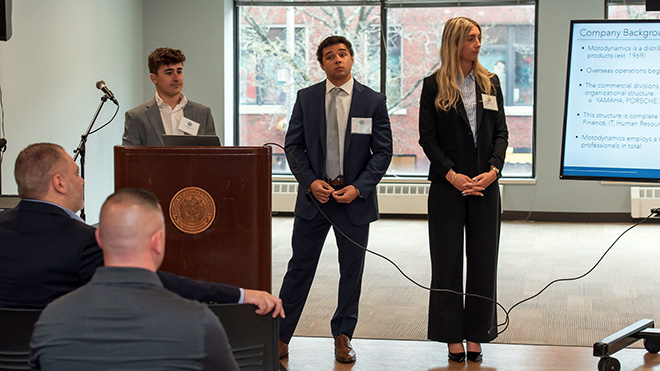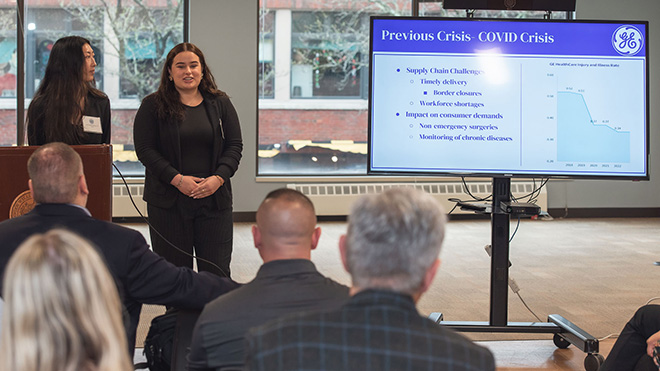Business Insights from Greece: MBA Graduates Share Lessons from International Crisis Management Program
MBA students present their findings on improving crisis management procedures for Athens-based companies as part of RWU and American College of Greece study abroad program.

BRISTOL, R.I. – After two years in the making, 23 MBA students presented the lessons they had learned studying and implementing crisis management strategies for businesses in Greece to the Rhode Island business community and general public at a Crisis Management Symposium held at RWU’s University College campus on May 3.
The event was part of an international experiential learning program between RWU’s Mario J. Gabelli School of Business and the American College of Greece (ACG), a partnership facilitated by RWU President Ioannis N. Miaoulis, a native of Greece, and supported by a U.S. Department of Education grant. Over the 2022-23 and 2023-24 academic years, two cohorts of MBA students studied crisis management in their RWU courses and connected with small- and medium-sized businesses in Greece to learn their challenges and develop business strategies for them.
As part of the program, the MBA students participated in a nine-day study-abroad program, traveling to Athens to serve as crisis management consultants and meet in person with Greek businesses across industries, where they presented their ideas and solutions to the business owners they had been working with.
This was a real-world experience that has prepared the students with skills and strategies they can use in their professional careers, according to Jason Oliver, MBA Program Director and Professor of Marketing at RWU. “In addition, this experience gives the students such a confidence boost,” Oliver said. “If they can create successful initiatives with an international company where you don’t speak the language, they can do it anywhere.”
The MBA students then brought those lessons learned back to share with the Rhode Island business community in the Crisis Management Symposium. Working with diverse Athens-based companies in the automotive, healthcare, telecommunications, and technology solutions industries, the students presented insights from the short- and long-term crisis management plans they had created for each company, founded in their research of how organizations successfully respond to crises, such as the world economic challenges of 2008 and the Covid pandemic. The event also featured keynote speakers Paari Gopalakrishnan, President and COO of Kent Hospital, and Basem Neseim, Chief Digital Officer at FM Global, who spoke about their firsthand accounts in times of crisis in their respective industries.

For the automotive company, Motodynamics, MBA students Isabella Wierzbicki ’23, M’24 of Wareham, Mass.; Orlando Fernandes ’23, M’24 of Trumbull, Conn.; Kevin Murphy ’23, M’24 of Ramsey, N.J.; Edward Troyano ’23, M’24 of Wading River, N.Y.; Nathan Nichols ’23, M’24 of Framingham, Mass.; and Ari Dinerman ’23, M’24 of Ashland, Mass., proposed solutions for navigating international financial crises, ranging from the internationalization of operations to the establishment of an internal crisis management task force.
“Make sure you're incorporating a crisis management task force not just in your management team, but in your entire organization, and help to make them stronger. This will allow you to be much more resilient during times of financial or national recessions,” Dinerman shared with the audience at the symposium.
The student team of Dylan Palinkas ’23, M’24 of Trumbull, Conn.; Justin McDermott ’23, M’24 of Bloomfield, Conn.; Nicholas Tucclli ’23, M’24 of Billerica, Mass.; John (Jack) Raithel ’23, M’24 of Woburn, Mass.; William Hurwitz ’23, M’24 of Longmeadow, Mass.; and Ben Dubois ’23, M’24 of Rehoboth, Mass., explored the impact of COVID-19 at OTE, one of the largest telecommunications companies in Greece, and suggested solutions to ensure future resilience and operational efficiency.
“Since internet usage was up during COVID, we shared some customer-focused recommendations around continuously trying to improve OTE’s services, mostly based on their customer’s messaging to recommendations for infrastructure base,” said McDermott.

Taking a look at how major global companies can respond to worldwide events, the student team of Halei Allen-Morabito ’23, M’24 of Manorville, N.Y.; Emily Neubig ’23, M’24 of Northford, Conn.; Emma MacLean ’23, M’24 of Newton, Mass.; Hailey Pereira ’23, M’24 of Fall River Mass.; and Leila Dumas Hovey ’23, M’24 of Quincy, Mass., explored how GE Healthcare navigated global crises like the recent Ukraine-Poland conflict and the COVID-19 pandemic. Their approach advocated for the implementation of predictive AI, enabling proactive resource allocation and strategic planning to navigate future crises effectively.
“Based on our research we found that competitors were similarly using AI, although they weren't taking it one step forward by using it to be more proactive,” said MacLean. “The use of AI systems to say, ‘Is this drug working within their clinical trials?’ ‘Is there a potential virus or something that we can start with a drug for now?’ So, our recommendation is to use it for predictive solutions to try to find innovative solutions ahead of the game.”
The student team of Roman Mayer ’23, M’24 of Lincoln, Vt.; Noah Ravas ’23, M’24 of Baldwinsville, N.Y.; Chris Pena ’23, M’24 of Worcester, Mass.; Christine Chasse ’23, M’24 of Ocean Park, Maine; Brendan Serenson ’23, M’24 of West Haven Conn.; and Kayana Rubino ’23, M’24 of Griswold, Conn., focused on improving cybersecurity processes and protocols at Qualco, a financial services company. Using the S.P.L.I.T method, the students audited existing crisis policies, emphasizing enhancements in structure, process, language, identity, and technology to strengthen Qualco's cyber defense infrastructure.
“From our time in Greece, we gained professional experience working on this project and ultimately learned a lot about cybersecurity. Everybody also brought back cultural experience working internationally. It’s something we will use in the future,” said Serenson after their presentation.
Not many graduates can say they worked with real clients on actual problems their companies are facing – and that should give RWU’s MBA graduates a distinctive skillset and experience to share with future employers, according to Oliver.
“When an interviewer asks, ‘Tell me about a time when you were presented a challenge, and how you overcame it.’ – these students will have the perfect answer, and that’s why this project is so impactful,” Oliver said.
